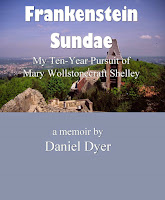• In volume
three of her series, there is a touching moment when Mary quotes her own father,
William Godwin, about Cervantes (1547–1616), the subject of this entry. The greatest men have looked upon Don
Quixote as the best book that was ever
written. Godwin said, “At twenty I thought Don Quixote laughable—at forty I thought it clever—now, nearly sixty, I look upon
it as the most admirable book in the whole world.”[1]
• Throughout
her volumes and entries, Mary is particularly sensitive to death—of the
principal whose life she is rehearsing, of relevant loved ones. And knowing how
death has been such an unwelcome guest in her own life, I read these entries
with a bit of emotion from time to time; it’s surprising, I know, to report
that while reading encyclopedia
entries from the mid-1830s I found myself occasionally … red-eyed.
In her first
volume about French writers, she paused in her biography of Rochefoucauld (1613–1680)
to write this paragraph about death: These
are the stings, this the poison, of death.
There is no recal [sic] for a hasty word; no excuse, no pardon, for
forgetfulness, for injustice or neglect;—the grave that has closed over the
living form, and blocked up the future, causes the past to be indelible; and,
as human weakness for ever errs, here it finds the punishment of its
errors. While we love, let us ever
remember that the loved one may die,—that we ourselves may die. Let all be true and open, let all be faithful
and single-hearted, or the poison-harvest reaped after death may infect with
pain and agony one’s life of memory.[2]
If you know
anything about the life of Mary Wollstonecraft Godwin Shelley, you know that as
her hand wrote these words, she was thinking of her lost children, her lost
husband and friends. And she knew that her father was aging, and, in fact, he
would live only a year after this volume appeared.
[1] Lives of the Most Eminent Literary and Scientific Men of Italy, Spain,
Portugal, vol. 3 (London: Longman Rees, Orme, Brown, Green & Longman;
John Taylor, 1837), 182.
[2] Eminent Literary and Scientific Men of France, vol. 1 (London: Longman,
Orme, Brown, Green, & Longmans; John Taylor, 1838), 91.


No comments:
Post a Comment